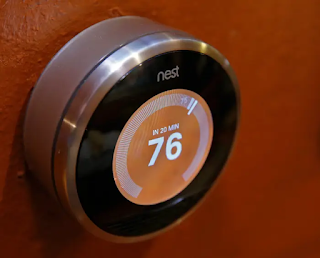A year ago, a Houston Reddit board user noticed something strange was happening in his home. His smart thermostat was changing temperatures, but no one had touched it.
“We noticed since yesterday smart thermostats like Nest or Ecobee are changing temp to 78 automatically,” the person wrote. “We have 8 for sure cases among family and friends.”
Before long, there were 140 comments from Texas users who said they had experienced the same thing.
“This happened to us during the Freeze,” one commenter said. “Every time we tried to warm the house up even a few degrees, it would enter an “energy savings event” and flip all the way back down to 58-60.”
Now, with ERCOT having issued conservation appeals on Monday and Wednesday, smart thermostats are again being remotely adjusted by Texas power companies in order to lower demand during the heat wave. If you’re enrolled in certain energy-saving programs, chances are you may have noticed your thermostat going up a few degrees automatically.
“Across Texas, tens of thousands of customers elect to participate in what are known as Demand Response Programs that help to reduce the strain on Texas’ grid in extreme weather. ERCOT, the TDUs (Transmission and Distribution Utility – like Oncor), and retail electric providers all encourage Texans to participate as a way to conserve energy and save money on their energy bills,” TXU spokesperson Kyle Weeks told the Star-Telegram. “Demand response programs can automatically adjust the set temperatures on customers’ thermostats by a few degrees for a short time, normally less than an hour, when the grid sees incremental stress (this can be called by ERCOT, the TDUs or the retail electric providers). While customers agree to this upfront as an important conservation tool, they can typically override the demand response event depending on their unique needs.”
Despite energy companies assuring customers that they could opt out of temperature adjustments at any time, some smart thermostat users have said that they were unable to do so. A Texan on TikTok said he couldn’t lower the temperature on his Nest thermostat even after the 3:30 to 5:30 p.m. peak demand period.
Smart devices may make some aspects of life easier - but at what cost? Are you giving up control of your life to a piece of software... or to some bureacratic agency or corporation somewhere far away?
The ease with which your home can be invaded, altered, and surveilled in today's modern world is startling. These devices may seem novel and trendy, but be aware of the potential drawbacks.
One can look at China for an example of a society that has taken technology and software to an extreme point, where their social credit system controls every facet of life and punishes citizens who are deemed to be violating any aspect of the Communist Party way by restricting their freedom of movement, freedom of speech, freedom of information, and freedom of commerce.
You may say, "But that's Communist China. This is America."
Mark my words. We're headed there. It may not be government-led here, at least at first, but the corporate world is moving that direction.
Maybe "smart" isn't so smart after all.










0 comments:
Post a Comment
PLEASE INCLUDE YOUR NAME when commenting. Anonymous comments may be rejected if NOT accompanied by a name.
Comments are welcome, but remember - commenting on my blog is a privilege. Do not abuse that privilege, or your comment will be deleted.
Thank you for joining in the discussion at MuskogeePolitico.com! Your opinion is appreciated!